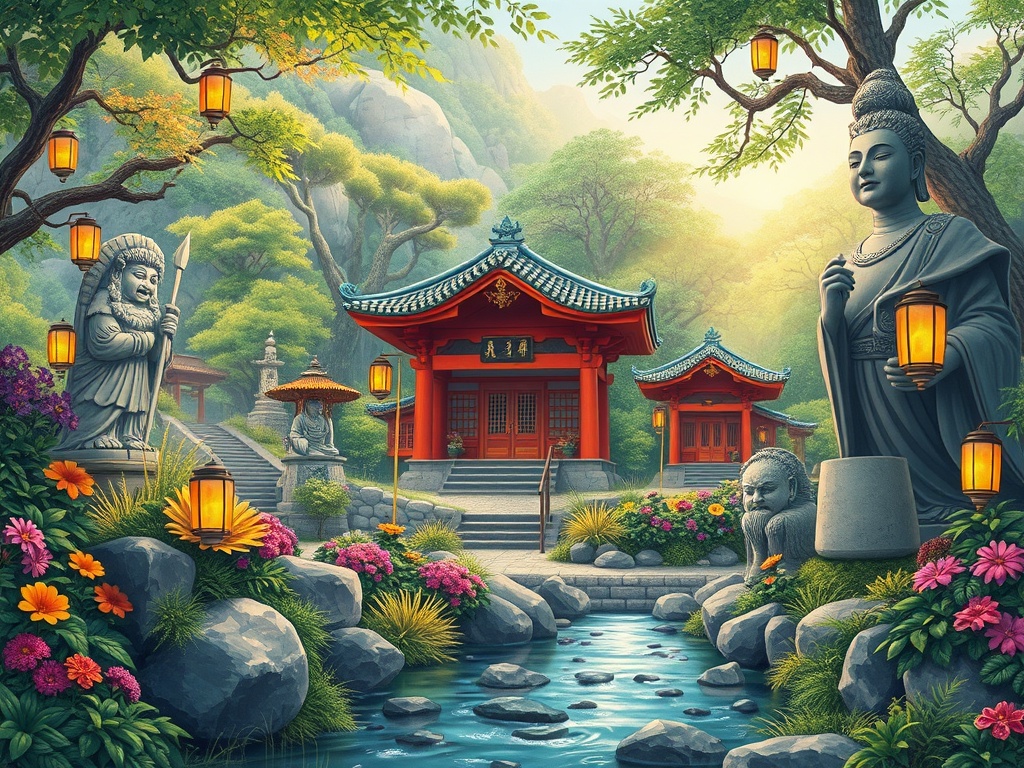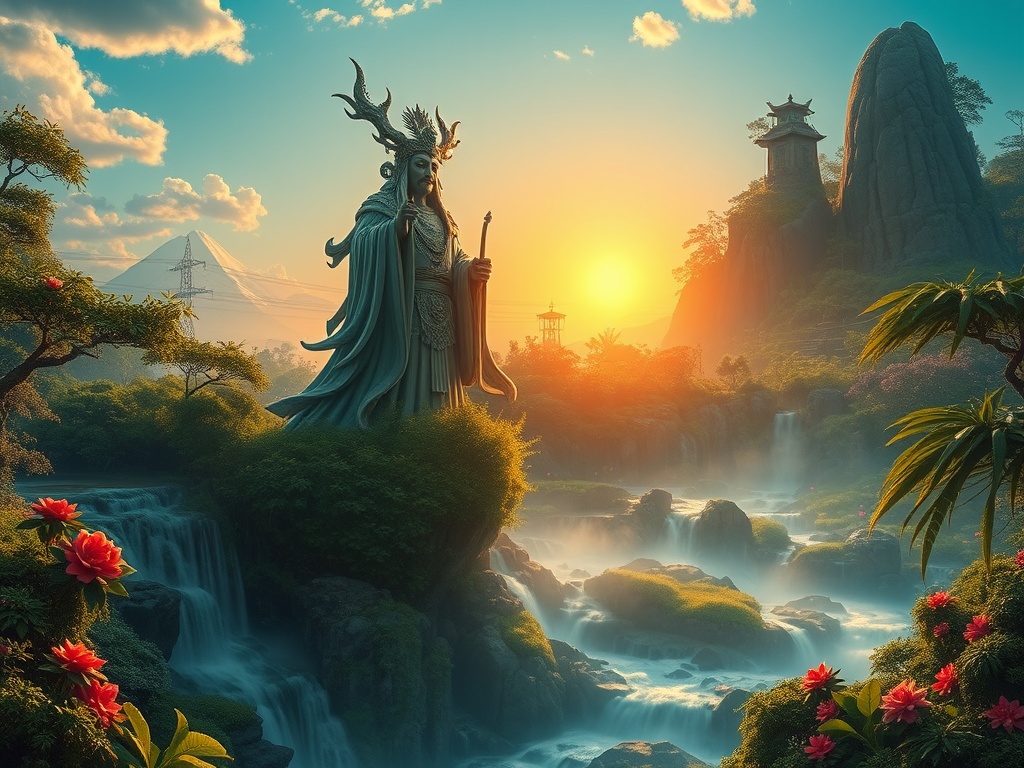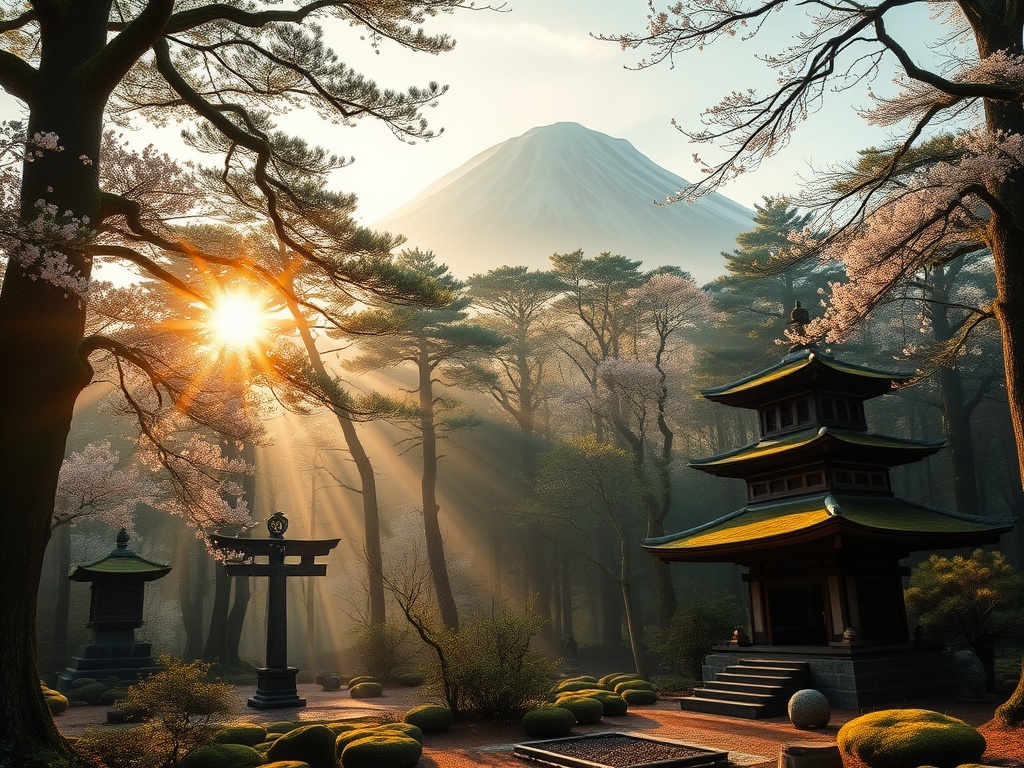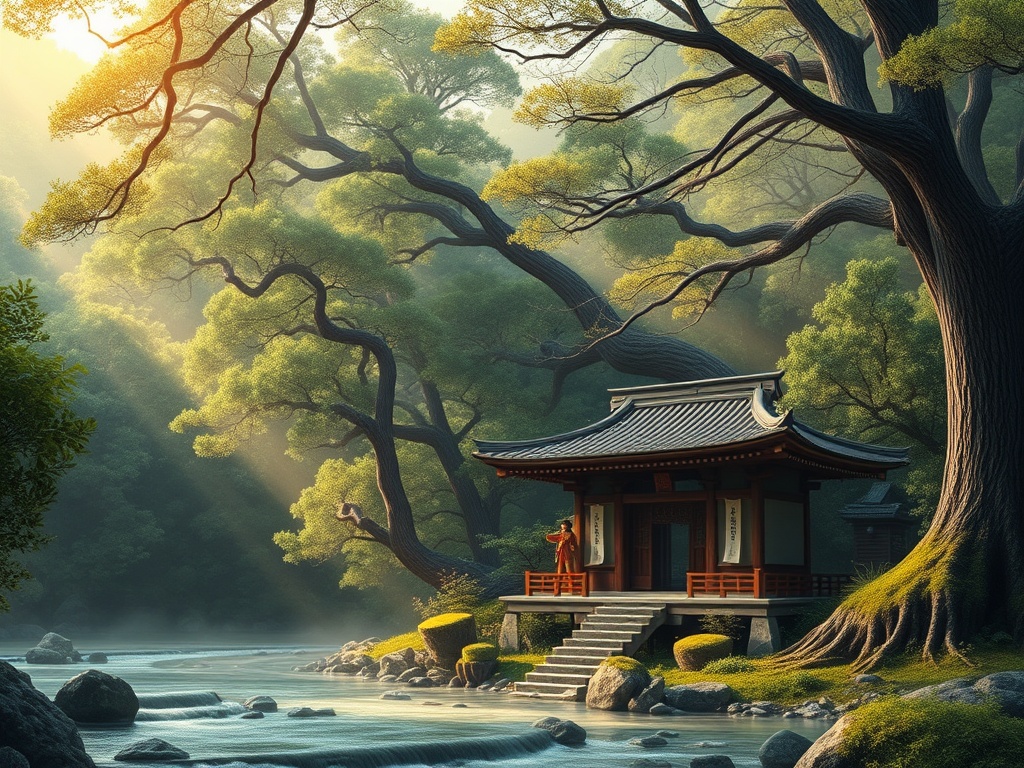Unearthing the Legends: The Ancient Earth Deities of Japan
Win a Free Trip to Japan!
Experience cherry blossoms and ancient temples
Japan’s vibrant mythology is a tapestry of fascinating deities, each representing a unique aspect of nature and human life. Among these, the earth deities stand out for their profound connection to the land, agriculture, and the very landscapes that shape the Japanese archipelago. As you embark on this enchanting journey, you’ll discover the tales of these divine beings and the sacred sites that honor them.
The earth deities in Japanese mythology are revered for their role in nurturing the land and its people. Their stories are deeply intertwined with the natural world, offering insights into Japan’s cultural heritage and spiritual beliefs. Whether they are shaping mountains or guiding harvests, these deities hold a special place in the hearts of the Japanese people.
Below is a list of some of the most significant Japanese earth deities:
- Ōkuninushi: Known as the Great Land Master, Ōkuninushi is a prominent figure in the Izumo region and is celebrated for his contributions to agriculture and medicine.
- Kunino Tokotachi: One of the primordial deities, Kunino Tokotachi is associated with the very foundation of the earth.
- Haniyasu-hime and Haniyasu-hiko: Often depicted as a divine couple, they represent the clay and earth, crucial to agriculture and pottery.
Japan’s landscape is dotted with shrines and sacred sites dedicated to these earth deities, offering travelers a unique opportunity to explore the spiritual heart of the country. Visiting these sites provides not only a glimpse into ancient rituals but also breathtaking views of Japan’s natural beauty.
One such site is the Izumo Taisha, one of the oldest and most revered Shinto shrines, believed to be the home of Ōkuninushi. This site is a must-visit for those interested in history and mythology, offering a serene atmosphere perfect for reflection and appreciation of Japan’s rich cultural tapestry.
Embarking on a journey to discover Japan’s earth deities promises an unforgettable adventure filled with mythological wonders and stunning landscapes. Whether you’re a seasoned traveler or a curious explorer, these legends offer a deeper connection to the land and its ancient spiritual traditions.
Sacred Landscapes: Where Mythology Meets Nature
Japan’s sacred landscapes offer a mesmerizing blend of mythology and nature, weaving tales of divine interactions into the very fabric of the land. These landscapes are not just natural wonders; they are living stories, where every mountain, river, and forest carries whispers of ancient deities. As you traverse these mystical terrains, you’ll find yourself stepping into a world where nature and spirituality dance in perfect harmony.
The mountains of Japan are more than just towering peaks; they are the abodes of deities and the backdrop for countless legendary tales. Mount Fuji, Japan’s most iconic peak, is revered not only for its breathtaking beauty but also as the dwelling place of the goddess Sengen-Sama. This majestic mountain is a pilgrimage site for both local and international travelers, offering a spiritual ascent that promises a deeper connection with nature. Similarly, the lush forests of Aokigahara, at the base of Mount Fuji, are steeped in mystery and folklore, inviting explorers to delve into their enigmatic depths with respect and reverence.
Flowing through the heart of Japan’s mythology are the numerous rivers and springs that are considered sacred by the Japanese people. These waterways are believed to be imbued with divine energy, providing life and sustenance to the land. The Kamo River in Kyoto, for example, is not only a serene spot for reflection but also a place of worship where rituals are performed to honor the water deities. Traveling along these rivers offers a unique opportunity to witness the harmonious blend of natural beauty and spiritual significance, a testament to the deep respect the Japanese have for their environment.
Guardians of the Soil: The Role of Earth Deities in Japanese Culture
In the rich tapestry of Japanese mythology, earth deities play an integral role as the guardians of soil and sustenance. These divine protectors are not merely figures of ancient tales; they continue to influence Japanese culture, from agricultural practices to spiritual rituals. As you delve into their world, you’ll uncover how these deities shape the cultural identity of Japan, offering insights into a society that harmonizes with nature.
Earth deities in Japan are more than mythical beings; they are cultural icons that symbolize the deep connection between humanity and the earth. Their presence is felt in various aspects of life, from seasonal festivals to daily agricultural routines. For travelers, understanding these deities offers a window into Japan’s soul, where respect for nature is woven into the very fabric of society.
Key Roles of Earth Deities:
- Agricultural Guardians: These deities oversee the fertility of the land, ensuring bountiful harvests and prosperity for communities.
- Spiritual Protectors: They are revered in rituals and ceremonies, embodying the spiritual essence of the natural world.
- Cultural Icons: Their stories and symbols are prevalent in art, literature, and traditional practices, reflecting Japan’s rich cultural heritage.
Throughout the year, numerous festivals and rituals pay homage to these deities, offering travelers a unique glimpse into Japan’s vibrant cultural calendar. Participating in these events provides an opportunity to witness the enduring legacy of earth deities in contemporary Japanese society.
Notable Festivals:
- O-Tauchi Matsuri: Celebrated in various regions, this festival is dedicated to thanking the earth deities for a successful harvest.
- Shimenawa Ceremony: A traditional ritual involving sacred ropes, symbolizing the purification and protection of sacred spaces by earth deities.
Rituals and Reverence: Celebrating the Earth Spirits
As you delve deeper into the heart of Japan, you’ll uncover a rich tapestry of rituals and ceremonies that honor the earth deities—ancient spirits believed to be the guardians of the land. These traditions, steeped in centuries of history, offer travelers a rare glimpse into the spiritual life of the Japanese people, where every festival and ritual is a bridge between the past and the present.
Japan’s cultural calendar is peppered with vibrant festivals that celebrate the earth spirits, marking the changing seasons with joy and reverence. These events are an invitation to witness the Japanese way of life, where nature’s rhythms are harmonized with human festivities. One such celebration is the O-Tauchi Matsuri, held in various regions, where locals express gratitude to the earth deities for a bountiful harvest. Attending such a festival not only offers a sensory feast of colors, sounds, and tastes but also a profound connection to the spiritual essence of the land.
Beyond festivals, numerous rituals throughout Japan serve as daily reminders of the deep respect for earth deities. The Shimenawa Ceremony is a traditional practice involving the use of sacred ropes to purify and protect spaces, creating a tangible link between the physical and spiritual realms. Participating in or observing these rituals allows travelers to experience a profound sense of peace and respect for the earth, showcasing how spirituality is intricately woven into the fabric of Japanese society.
In the exploration of Japan’s earth deities, every step becomes a journey of discovery, where the ancient and the contemporary coexist in harmony. These rituals and celebrations highlight the enduring legacy of earth spirits, offering an enriching experience for anyone eager to explore the mystical and cultural wonders of Japan.
From Mountains to Gardens: Exploring Divine Abodes
When embarking on a journey through Japan, one can truly appreciate the majestic landscapes that are not just breathtakingly beautiful but also steeped in myth and spirituality. The divine abodes of the earth deities span from towering mountains to tranquil gardens, offering a unique insight into Japan’s harmonious blend of nature and mythology. Whether you find yourself gazing at the sacred peaks or strolling through meticulously designed gardens, these sacred spaces invite you to explore their enchanting tales and spiritual significance.
Among the most revered landscapes are the mountains of Japan, considered the sacred dwellings of various deities. Mount Fuji, with its iconic symmetrical cone, stands as a towering symbol of spiritual ascent. Revered as the abode of Sengen-Sama, the goddess of the mountain, Mount Fuji attracts pilgrims and travelers alike, offering both a physical and spiritual journey. As you ascend its slopes, you are invited to reflect on the profound connection between the earth and the divine, where every step is a step closer to the heavens.
Other peaks, such as Mount Haku and Mount Tate, are part of the sacred triad known as the Three Holy Mountains of Japan. These sites are not only natural wonders but also revered places of worship, where the earth deities are believed to reside, blessing the land and its people with their presence. Exploring these mountains provides a unique opportunity to delve into the heart of Japan’s spiritual landscape, where nature and divinity intertwine seamlessly.
Beyond the mountains, Japan’s gardens offer a more intimate encounter with the earth deities. These meticulously crafted spaces are designed to embody the essence of nature’s beauty and tranquility. Renowned gardens such as the Kenroku-en in Kanazawa and the Katsura Imperial Villa in Kyoto are masterpieces of landscape design, reflecting the harmony and balance revered by the Japanese.
In these gardens, one can find the subtle presence of earth deities, whose influence is evident in the careful arrangement of stones, water features, and plant life. Visitors are encouraged to immerse themselves in the serenity and spiritual ambiance, gaining a deeper appreciation for the role of these divine beings in shaping Japan’s cultural and natural heritage. As you wander through these earthly paradises, you are invited to connect with the timeless spirit of the land, where every element holds a story of divine connection and reverence.
Japanese Earth Deities and Their Influence on Modern Tourism
In the mesmerizing realm of Japanese mythology, the earth deities not only shape the cultural identity of the nation but also influence its appeal as a travel destination. For travel and tourism enthusiasts, exploring these divine connections offers a unique journey through Japan’s rich heritage, where ancient stories and modern experiences intertwine. As you traverse the landscapes imbued with the presence of these sacred figures, you’ll uncover how their mythological legacy continues to captivate and inspire visitors from around the globe.
Modern tourism in Japan thrives on the allure of its mythological landscapes, with sacred sites dedicated to earth deities drawing countless visitors each year. These locations offer more than just aesthetic pleasure; they provide a window into the spiritual heart of Japan. Places like the revered Izumo Taisha, home to the Great Land Master Ōkuninushi, invite travelers to embark on a pilgrimage that blends historical exploration with spiritual reflection. The profound ambiance and breathtaking beauty of such sites make them essential stops for those seeking a deeper connection with Japan’s divine heritage.
The influence of earth deities extends into the vibrant cultural experiences awaiting tourists in Japan. Throughout the year, festivals that celebrate these deities offer a lively glimpse into traditional Japanese life. Travelers can witness the colorful processions and rituals of events like the O-Tauchi Matsuri, where gratitude is expressed for the earth’s bounty. Participating in these festivals not only immerses visitors in the joyous atmosphere but also provides an opportunity to experience the enduring reverence for nature that defines Japanese culture.
In this fascinating fusion of mythology and tourism, Japan offers an unparalleled travel experience. By exploring the sacred sites and participating in the cultural festivities inspired by earth deities, visitors are invited to delve into a world where the ancient and modern coexist, creating a tapestry of spiritual and cultural richness.



